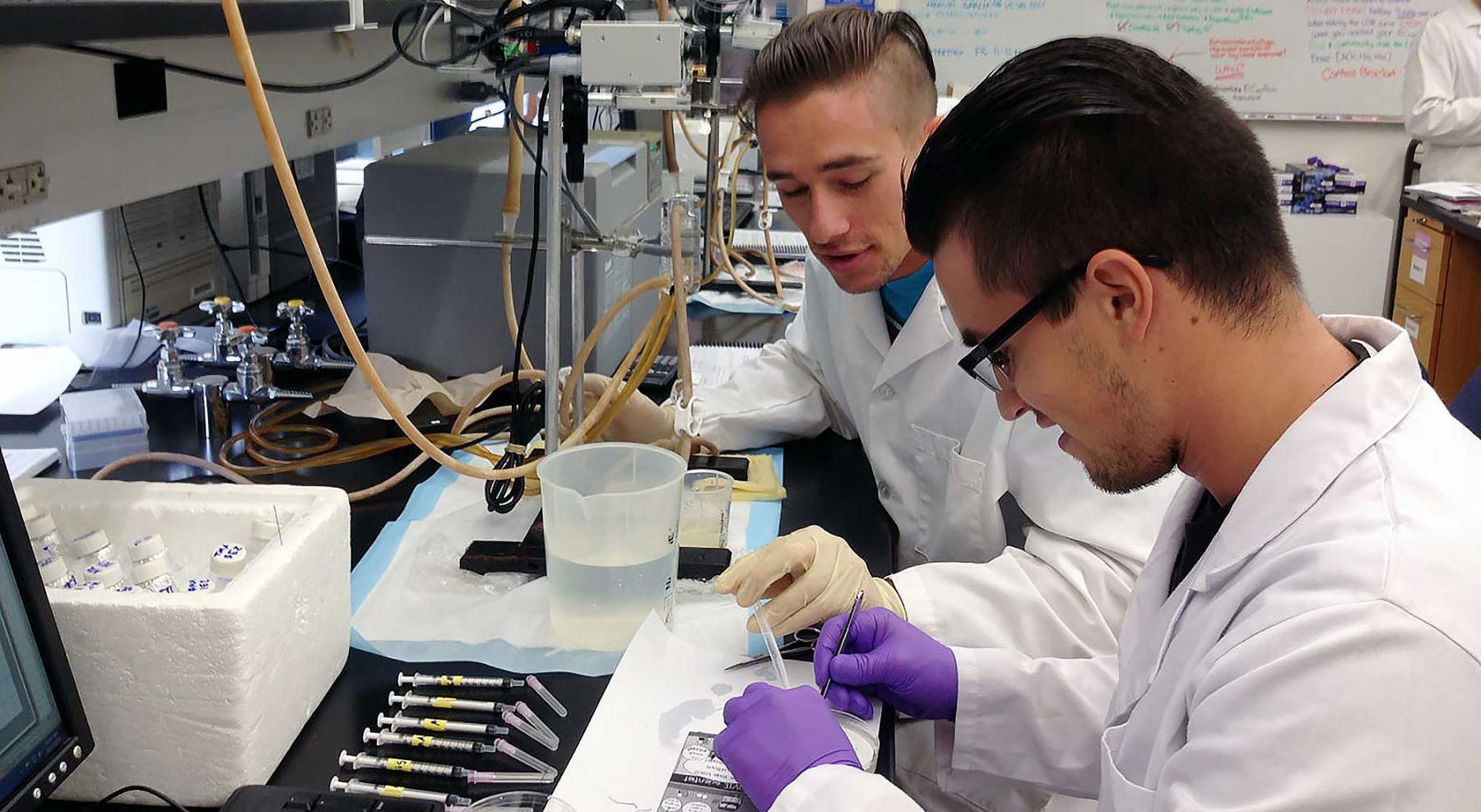Pharmacology is a subject that integrates knowledge of biochemistry, cell and molecular biology, physiology, and chemistry to study the relationship between biological processes and therapeutic agents. Pharmacologists investigate the active effects and mechanisms of drugs and chemical agents within living organisms. The areas of pharmacology are many and diverse, and include the therapeutic and toxicological actions of drugs on humans, animals and microorganisms; the influence of chemicals upon the environment and biological ecosystems, and the use of drugs as research tools for the elucidation of molecular and biochemical mechanisms.
In 1974, UCSB became the first campus in the nation to offer an undergraduate pharmacological sciences curriculum. In contrast to professional programs in medicine, nursing, and pharmacy, which emphasize the therapeutic principles and applications of pharmacology, MCDB emphasizes pharmacology as a basic science. MCDB’s Pharmacology major is designed for students with research interests in all areas of the health sciences.
The Pharmacology Major (BS)
Students planning to major in pharmacology enter as a biological sciences pre-major and take a common core curriculum of introductory biology, general chemistry, mathematics, physics, and organic chemistry. Students should complete this preparatory coursework in their freshman and sophomore years. Following successful completion of seven of these courses, students may advance from biology pre-major to full major status.
The pharmacology major centers around the Pharmacology lecture series (MCDB126 + MCDB 126B), the Pharmacology labs (MCDB126AL & BL), and the Pharmacology Colloquium. The Colloquia are a series of seminars delivered by distinguished visiting pharmacologists from academia and the pharmaceutical industry and is designed to familiarize students with the current "state of the art" of pharmacology. The Pharmacology series is typically taken by students in their 4th year of studies, whereas basic coursework in biochemistry, and genetics is usually completed in their 3rd year. Students round out their degree by selecting electives in molecular and cellular biology, neurobiology, biochemical pharmacology, physiology and developmental biology. Students should review the full requirement sheet for the major they intend to declare and plan their schedules accordingly.
Careers in Pharmacology
The Pharmacology major prepares students for a wide range of careers, and MCDB's Pharmacology students have been highly successful in their chosen fields. The demand for graduates continues both within the pharmaceutical & biotechnology industry and in university pharmacology & molecular biology departments nationwide. The Pharmacology major can also prepare students for graduate study and professional programs leading ultimately to careers in medicine, pharmacy, dentistry, veterinary medicine, and other health sciences. Common careers utilizing the Pharmacology BS include: Pharmacist, Clinical pharmacologist, Drug Discovery, Drug Development, and Regulatory Affairs, Toxicologist, Biomedical Scientist, Pharmaceutical Salesperson, Laboratory Technician, Health Professions Provider, Dentist, Chiropractor, Opthalmologist, Biotechnology Researcher, Pharmaceutical Researcher, Physician, MD, Professor,Teacher, and Veterinarian.
Students interested in the health sciences and related professions can take advantage of the University's excellent health science advisory system located in Cheadle Hall. They can seek advice and support from the beginning of their studies in biology to their entrance into health sciences graduate programs and professional schools.
Students interested in teaching biological sciences and conducting research at the university level should plan to complete the Ph.D. degree. Students interested in teaching at a community college should pursue graduate work at least through the master's degree. Teaching at the junior high or high school (secondary) level requires the California single subject teaching credential. Students considering this last option should discuss their plans with the credential advisor in UCSB's Graduate School of Education early in their academic careers.
High School Preparation
Recommended as part of or in addition to the UC admission requirements:
- One year of biology
- One year of chemistry
- Mathematics through trigonometry
- One year of physics
Transfer Preparation
To make normal progress in the major, complete the following courses prior to transferring to UCSB:
- One year sequence of general chemistry with laboratory
- One year sequence of biology with laboratory
- One year sequence of organic chemistry with laboratory
- Two terms of calculus and either a third term of calculus or one term of statistics
- One year sequence of physics with laboratory
Please see the UCSB General Catalog or your high school or community college counselor for more information on course preparation.
Additional Information
For further information please consult one of the biology undergraduate academic advisors.
FAQs
- How many upper division biology courses should I take per quarter?
-
We recommend taking two upper division biology courses per quarter (assuming 8.0 units per quarter) and, if possible, fulfilling area specific requirements first starting one's Junior/3rd year. This will give you the required 48.0 units required for most of our majors. For more detailed recommendations for the MCDB majors please go to: Resource Documents: Recommended Schedule - MCDB majors.
Pharmacology Contact
Tanja Stoyan
tstoyan@ucsb.edu
